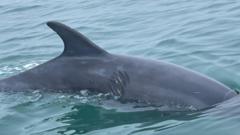Should Swimmers Steer Clear of the Playful Dolphin?

Authorities are warning the public to steer clear of a specific area in Lyme Bay, Dorset, where a playful bottlenose dolphin has been seen engaging closely with swimmers. This dolphin, affectionately known as Reggie, poses potential risks both to itself and the public due to its boisterous behaviour. Marine experts stress the importance of observing wildlife from a safe distance to protect both marine life and human safety.
Last updated: 26 October 2023 (BST)
Key Takeaways
- The bottlenose dolphin, named Reggie, has been displaying playful but risky behaviour around swimmers.
- Marine Connection charity advises the public to avoid water areas where Reggie is spotted.
- Dolphins are social creatures, and solitary individuals like Reggie can become unpredictable.
- Experts recommend maintaining a distance of at least 100m (328ft) from dolphins.
- Reggie's playful behaviour has led to incidents where swimmers were pushed underwater.
Understanding Reggie's Behaviour
Reggie, the dolphin in question, has been described as both "playful" and "boisterous" by Liz Sandeman, co-founder of the Marine Connection charity. With its impressive weight of 1,000 pounds (453 kg), Reggie's actions can inadvertently lead to dangerous situations for swimmers who may not expect such interaction. This dolphin's playful antics have included dunking individuals underwater, which, while not aggressive, can still be alarming and hazardous.
Why Is Reggie Acting This Way?
The behaviour exhibited by Reggie is not uncommon among dolphins. Many dolphins are known for their high energy and social interactions, often engaging in playful behaviours with one another in their pods. However, solitary dolphins, like Reggie, may develop different patterns of interaction, especially with humans. The reasons for such solitary behaviour can vary, ranging from natural social dynamics to environmental factors.
Risks of Human Interaction
Interactions between humans and dolphins can lead to misunderstandings. While Reggie does not exhibit aggression, his size and strength could unintentionally result in injuries. Experts from the Marine Management Organisation (MMO) caution that dolphins, being wild animals, can be unpredictable. This unpredictability is underscored by past incidents, such as the tragic fate of another solitary dolphin named Danny, who was killed by a boat after engaging closely with humans.
Community Responsibility and Safety Measures
Marine Connection and the MMO have emphasised the need for community awareness and responsibility. With Reggie frequenting the area, both locals and visitors are urged to avoid entering the water where the dolphin is present. Sandeman suggests that simply moving to a nearby beach could significantly reduce the likelihood of encounters between the dolphin and people. The charity's advice is clear: observe from a distance to ensure the safety of both the swimmers and the dolphin.
Legal Protections for Marine Life
In the UK, dolphins, whales, and porpoises are protected by law, which means that any interference with their natural behaviour can have legal consequences. For this reason, it is crucial for boaters and swimmers to follow guidelines set forth by the MMO. They advise that boats reduce their speed to below six knots when in the vicinity of Reggie and maintain a safe distance to avoid startling the dolphin.
The Impact of Solitary Dolphins on Conservation Efforts
The presence of solitary dolphins like Reggie raises important questions about marine conservation and the impact of human activity on wildlife. While solitary dolphins may attract attention and intrigue, they also necessitate a careful approach to ensure their safety and wellbeing. Marine experts continue to study these behaviours to better understand the challenges faced by solitary marine mammals and the implications for conservation strategies.
Learning from Past Experiences
The case of Danny in Portland serves as a cautionary tale about the risks involved when dolphins become too accustomed to human presence. While Reggie's playful manner may delight onlookers, it also underscores the importance of maintaining a respectful distance to protect both the animals and the public. Education and awareness can play a significant role in mitigating risks associated with such interactions.
What Can You Do?
As a member of the public, you can play a vital role in ensuring the safety of marine life and fellow beachgoers. Here are some practical steps you can take:
- Stay informed about local marine wildlife and any advisories issued by marine organisations.
- Observe dolphins and other marine animals from a safe distance, ideally at least 100m (328ft).
- Report any unusual or concerning behaviour from marine animals to local wildlife authorities.
- Educate others about the importance of marine conservation and responsible behaviour around wildlife.
Looking Ahead
As Reggie continues to interact with the public, it is crucial to monitor his behaviour and the responses from the community. The potential for growth and increased strength means that what may seem harmless now could evolve into a greater concern in the future. Continued observation and adherence to safety guidelines will be paramount in maintaining a safe environment for both Reggie and the public.
FAQs
What should I do if I see Reggie in the water?
It is best to avoid entering the water if you see Reggie. Observe from a distance to ensure both your safety and that of the dolphin.
How far should I stay away from dolphins when swimming?
Experts recommend maintaining a distance of at least 100m (328ft) from dolphins to avoid unexpected interactions.
What happened to the other solitary dolphin, Danny?
In 2020, the solitary dolphin named Danny, who had become well-known for interacting with humans, was tragically killed by a vessel.
Are dolphins dangerous to humans?
While dolphins are generally not aggressive, their size and playful behaviour can pose risks, especially if they inadvertently push swimmers underwater.
What laws protect dolphins in the UK?
Dolphins, whales, and porpoises are protected under UK law, making it illegal to disturb or harm them. Always observe wildlife responsibly.
Published: 2025-08-21 18:49:13 | Category: technology



